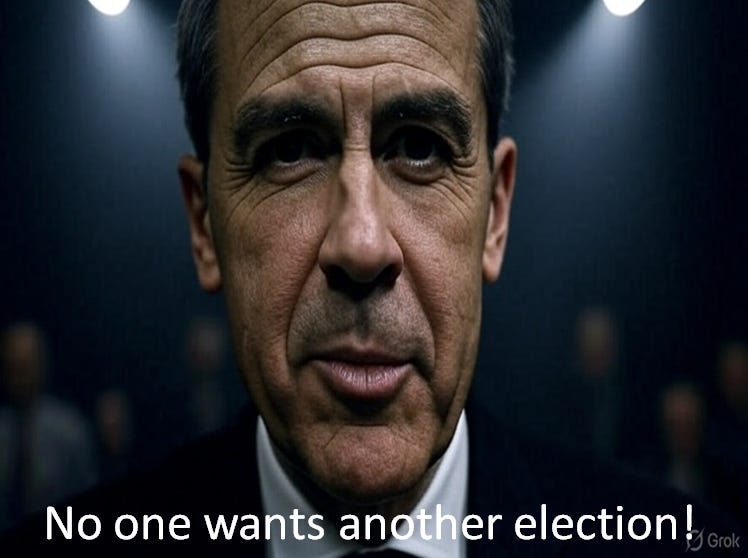The Throne Speech Gambit: A Dance of Power in Ottawa
The Conservatives, Bloc, NDP and other MPs publicly demonstrated their opposition to the government, without calling another election. No one wants another election so soon after the last one.
The Liberal minority government, led by Canadian Prime Minister Mark Carney, has secured the adoption of its Throne Speech in the Canadian Parliament.
The speech, presented on May 27th, 2025 by the UK’s King Charles III, was generally considered to be a roadmap for the Liberal’s intentions in the 45th Parliament.
It passed without a recorded vote, an unusual situation which sidestepped a confidence crisis in a fractious House of Commons.
This outcome, as noted in the the June 4th, National Post article, "Liberal government's throne speech passes in House of Commons without a vote," capped weeks of intense maneuvering, and followed on a narrowly passed opposition motion on June 2nd that exposed the Liberals’ vulnerability in their minority mandate.
For a new media overview of what happened, check out the June 5th, 2025 Elev8 on YouTube podcast, “NDP Pull Biggest VOTE FAKE-OUT in History—Liberals SCOLD Fraser in Embarrassing SHUTDOWN.”
In Canadian parliamentary practice, a Throne Speech passing without a formal recorded vote—often adopted “on division”—is not uncommon, though it is less frequent than a formal recorded vote.
The Throne Speech outlines the government’s agenda at the opening of a new parliamentary session and is typically followed by an “Address in Reply” motion, which is considered to be a confidence matter.
When a motion like the Address in Reply to the Throne Speech is tabled, the Speaker calls for a vote. If no MP objects, the motion can be adopted “on division,” meaning it passes with implied agreement (or lack of opposition) without recording individual MPs’ votes.
This requires either unanimous consent or “no vocal dissent” in the House.
In the case of the June 4th, 2025, Throne Speech, Chief Government Whip Mark Gerretsen moved to adopt the amended motion, and no opposition MPs demanded a recorded division, allowing it to pass quietly, as noted by the National Post article.
This avoided a roll-call vote that would have tallied each MP’s stance and could have caused the government to fall. In essence, the opposition parties could have won and blocked the Throne Speech, if they really wanted to do so.
For more on the potential for that seemingly lost opportunity, check out the June 4th, 2025 Michelle Rempel Garner on YouTube post, “BREAKING: NDP won't support confidence motion, TWO elections in one year??!!”
The Throne Speech, delivered by King Charles III on May 27, outlined ambitious Liberal priorities: economic growth through infrastructure, housing affordability, and enhanced border security to curb fentanyl smuggling.
Yet, in a minority government, its passage required deft negotiation with opposition parties. The Liberals, holding 169 seats (including Speaker Francis Scarpaleggia, who votes only in ties), needed opposition party’s support to survive a confidence vote.
The NDP, reduced to seven MPs and unwilling to renew its previous supply-and-confidence deal, posed a wildcard.
As noted in the June 4th, 2025 Toronto Star post, “Throne speech adopted without a vote in House of Commons,” Interim NDP Leader Don Davies stated his intention to vote against the speech, citing its vagueness, while Green Party Leader Elizabeth May signaled support, albeit with reservations about its lack of climate focus.
But the real drama unfolded days earlier, on June 2nd, when the Liberals suffered their first defeat in the new Parliament.
For an overview of that situation, check out June 4th, 2025 Juno News on YouTube post, “Carney LOSES vote in the House, refuses to open the books + it’s “pride season” now.”
Here’s the short version of what happened.
A Conservative amendment to the Throne Speech reply, tabled by interim leader Andrew Scheer, demanded a spring economic update or budget before the House’s summer recess on June 20th.
The non-binding motion passed 166-164, with all opposition parties—Conservatives, Bloc Québécois, NDP, and Green Party’s Elizabeth May—uniting against the Liberals,
Government Whip Mark Gerretsen downplaying the loss, insisting “nothing went wrong,” while Government House Leader Steven MacKinnon called it a mere “advisory resolution.”
Carney acknowledged the vote but sidestepped commitment, focusing instead on his broader economic agenda.

The amendment’s passage, incorporating Bloc and NDP tweaks on provincial autonomy and Indigenous considerations, was a symbolic blow, highlighting the Liberals’ precarious grip on power.
Conservative MPs, like Dan Albas and Kelly McCauley, pressed the government to respect the House’s will, while analysts noted the vote’s optics were damaging for Carney’s fledgling mandate.
Yet, the Liberals’ strategic silence on opposition intentions before June 4th paid off.
The absence of a formal vote averted a confidence showdown, allowing the Liberals to claim a “strong and focused agenda” without revealing the extent of the opposition’s strength.
This quiet Liberal victory masks ongoing challenges.
With the Conservatives vowing to oppose future confidence votes, Carney’s government remains on a tightrope. The Liberal’s are hoping that the opposition party’s don’t want another election in the near future.
Only time will tell if they’re right.
Portions of this story were researched and structured using AI, but Freedom Forum still hopes this story is helpful and informative.
If you agree, please support Freedom Forum’s sponsors by clicking on the images below.







The most important part of the throne speech was the acknowledgment that Canada is fully incompletely now a Terra nullius, and open for annexation 😁. The cleanup of the deep state is happening step by step. Unfortunately there is no politician in the entire country of Canada that has been left uncorrupted and on the right side of the law and history.